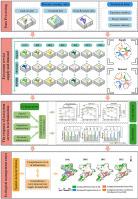沿海城市生态系统服务对 30 年城市化的响应:中国青岛市案例研究
IF 4.8
2区 环境科学与生态学
Q1 OCEANOGRAPHY
引用次数: 0
摘要
沿海城市地区在区域经济增长中发挥着举足轻重的作用,但同时也是自然环境与人类活动相互作用的敏感地区。快速城市化导致了生态问题,如沿海城市主要生态系统服务(ES)的退化。了解城市化对沿海城市生态系统服务供需的影响对于确保这些地区社会经济的健康和可持续发展至关重要。本研究以沿海城市青岛为例,重点研究了七种关键生态系统--碳固存、粮食生产、栖息地质量、娱乐能力、土壤保持、水产量和海水养殖的供需关系,以及它们对人口增长、经济发展和空间扩张这三个城市化不同方面的响应。研究结果表明(I) 从 1992 年到 2022 年,不同生态系统服务的演变呈现出多变性,都表现出明显的空间不平衡。(二)在此期间,青岛的城市化进程对生态系统服务的供需产生了明显的负面影响。空间城市化对碳封存、粮食生产、生境质量、水资源产量和海水养殖的影响最为显著,而人口城市化对休闲能力的影响最为明显。(三)不同类型的生态系统服务对人口、经济和空间城市化的敏感度不同。碳封存、粮食生产、娱乐能力、土壤保持、水产量和海水养殖对经济城市化最为敏感,而生境质量对空间城市化最为敏感。这项研究为沿海城市及其生态系统的可持续发展和综合管理提供了决策依据。本文章由计算机程序翻译,如有差异,请以英文原文为准。

The responses of ecosystem services in coastal cities to urbanization in 30 years: A case study of Qingdao City, China
Coastal urban areas play a pivotal role in regional economic growth, yet they are also sensitive regions where the natural environment interacts with human activities. Rapid urbanization has led to ecological issues, such as the degradation of key ecosystem services (ESs) in coastal cities. Understanding the impact of urbanization on the supply and demand of ESs in coastal cities is crucial for ensuring the healthy and sustainable development of the socio-economy in these areas. This study takes the coastal city of Qingdao as a case study, with a focus on the supply and demand relationships of seven key ESs—carbon sequestration, food production, habitat quality, recreational capacity, soil retention, water yield and marine aquaculture—as well as their responses to population growth, economic development, and spatial expansion, which are three distinct aspects of urbanization. The findings indicate that: (I) From 1992 to 2022, the evolution of different ESs exhibited variability, all displaying notable spatial imbalances. (II) During this period, the urbanization process in Qingdao had a pronounced negative effect on the supply and demand of ESs. Spatial urbanization had the most significant impact on carbon sequestration, food production, habitat quality, water yield, and marine aquaculture, while population urbanization most notably affected recreational capacity. (III) The sensitivity of different types of ESs to population, economic, and spatial urbanization varies. Carbon sequestration, food production, recreational capacity, soil retention, water yield, and marine aquaculture were most sensitive to economic urbanization, whereas habitat quality was most sensitive to spatial urbanization. This research provides a basis for decision-making in the sustainable development and comprehensive management of coastal cities and their ecosystems.
求助全文
通过发布文献求助,成功后即可免费获取论文全文。
去求助
来源期刊

Ocean & Coastal Management
环境科学-海洋学
CiteScore
8.50
自引率
15.20%
发文量
321
审稿时长
60 days
期刊介绍:
Ocean & Coastal Management is the leading international journal dedicated to the study of all aspects of ocean and coastal management from the global to local levels.
We publish rigorously peer-reviewed manuscripts from all disciplines, and inter-/trans-disciplinary and co-designed research, but all submissions must make clear the relevance to management and/or governance issues relevant to the sustainable development and conservation of oceans and coasts.
Comparative studies (from sub-national to trans-national cases, and other management / policy arenas) are encouraged, as are studies that critically assess current management practices and governance approaches. Submissions involving robust analysis, development of theory, and improvement of management practice are especially welcome.
 求助内容:
求助内容: 应助结果提醒方式:
应助结果提醒方式:


